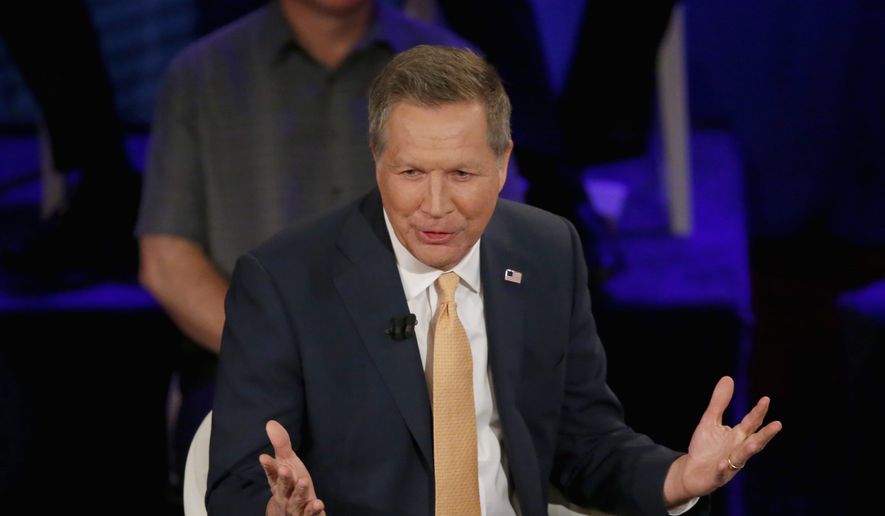John Kasich insists he gives the GOP its best chance to win the White House in November, and the polls say the Ohio governor is right.
The problem for Mr. Kasich: Republican voters don’t seem to care.
The party’s troops instead have rallied behind insurgent outsider Donald Trump and first-term Sen. Ted Cruz, who those same polls show losing to either of their potential Democratic opponents.
After having chosen the more moderate candidates who party leaders said were the most likely to win the White House in both 2008 and 2012, GOP voters are showing far less interest this year in electability.
“It is certainly true that Governor Kasich is perceived as the Republican candidate most in the ideological middle and often candidates who seeks that middle ground find it the place to be — but not every four years,” said Peter Brown, of the Quinnipiac University Polling Institute. “Ideology is not the coin of the realm in 2016. If it were, we might have different political environment.”
The road to the 2016 GOP nomination race is littered with carcasses of other candidates who fared well in head-to-head match-ups with Democrats, but who failed to catch on with Republican voters. Florida Sen. Marco Rubio, who like Mr. Kasich won in polling against Hillary Clinton and ran well against Sen. Bernard Sanders, was drummed out of the primary earlier this month after he failed to win his own home state’s primary.
Exit polls show electability ranks relatively low for GOP voters this year, well below considerations such as having a candidates who share their values, is a straight-shooter or can affect change once in office.
While voters may not care, though, GOP strategists do, saying either Mr. Trump or Mr. Cruz would be a problem.
“I never say never, but clearly both would start out in a hole vis-a-vis Clinton,” strategist Scott Jennings said.
“I also think a great many voters who are supporting Trump or Cruz just can’t fathom a world in which a single person would even consider voting for Hillary Clinton, so the idea that they need to capitulate to some media polling telling them to nominate some moderate they don’t like isn’t going to fly in this cycle,” he said.
The general election gap between Mr. Kasich and the other two candidates is sizable.
A Monmouth University poll last week of voters nationally found Mrs. Clinton topping Mr. Trump by 10 percentage points, and topping Mr. Cruz by 5 points. Mr. Kasich, though, leads her by 6 points.
Former New Hampshire Sen. Judd Gregg backed former Florida Gov. Jeb Bush in the GOP primary race, and now is an unbound delegate who plans to support Mr. Kasich.
“I think both Ted Cruz and Donald Trump create very serious issues for us in the general election,” Mr. Gregg said. “We probably have the weakest Democratic candidate in decades running in Hillary Clinton, so it is unfortunate.”
Mr. Kasich is looking to salvage his bid — and perhaps some vice presidential hopes — by sticking around and trying to convince voters that he is their strongest candidate in November election.
“Six national polls have been released last week that all show the same thing: I am the ONLY Republican candidate who can defeat Hillary Clinton in the fall,” Mr. Kasich said in an email blast this week.
Mr. Brown, though, said Mr. Kasich’s message is falling flat with GOP primary voters.
“Democrat voters might like Kasich better, and Kasich himself says he might do better in a Democratic than a Republican primary, but the reality is Kasich has won one primary and it was his own state,” Mr. Brown said. “It is hard to make the argument that the candidate who has won one of about 25 primaries is your best candidate.”
Mr. Kasich dismissed that argument during a CNN town hall meeting this week, saying he was ignored during the debates and that it took time for his optimistic message to resonate.
“I haven’t name-called. I haven’t had all these nasty sound bites. I’ve just been laying out my record and my vision for what I want to see happen,” he said.
He noted that of the 10 contested conventions in Republican party history, “the leader going into the convention has only been the nominee three times out of ten. Seven times out of ten they were not.”
• Seth McLaughlin can be reached at smclaughlin@washingtontimes.com.




Please read our comment policy before commenting.